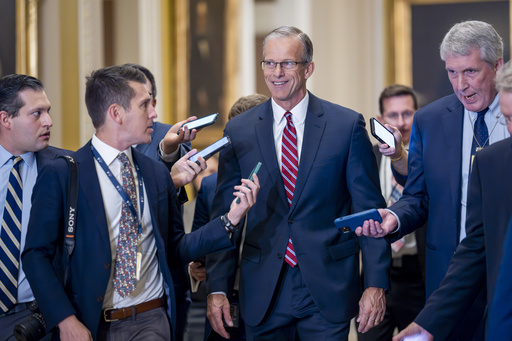WASHINGTON — Just hours after Republican Senator John Thune was named the incoming Senate majority leader on Wednesday, President-elect Donald Trump put him to the test by announcing his intention to nominate the controversial Representative Matt Gaetz as attorney general.
Gaetz, a Republican from Florida, is considered one of the most unpopular members of Congress, even among his fellow GOP lawmakers, due to his role in the removal of House Speaker Kevin McCarthy last year. Over his time in Congress, he has consistently criticized the Justice Department and is currently under investigation by the House Ethics committee for alleged sexual misconduct, drug use, accepting inappropriate gifts, and attempting to impede investigations into his behavior. Gaetz has denied all allegations made against him.
When approached about the nomination as he departed a Senate vote, Thune refrained from commenting, suggesting that it would be a better question for the chairman of the Judiciary Committee. Similarly, Republican Senator Charles Grassley of Iowa, who is anticipated to lead the Judiciary panel, stated that he is unfamiliar with Gaetz but will consider the nomination. He expressed reluctance to engage in further discussions on the topic.
Republican senators are accustomed to navigating questions about Trump; however, this situation is heightened as he prepares to take office for a second term. Congressional Republicans have organized strongly around him, tying their political fates to his administration’s success.
In the lead-up to his inauguration, Trump is already pushing congressional Republicans by putting forth potentially controversial appointments, including Gaetz, former Democratic Representative Tulsi Gabbard for the director of national intelligence, and conservative media figure Pete Hegseth for secretary of defense. Trump also suggested that the new Senate leader should permit him to appoint officials during recess, avoiding confirmation votes entirely.
North Dakota Republican Senator Kevin Cramer described Gaetz’s nomination as a “Hail Mary” play from Trump. Cramer expressed concern over Gaetz’s history as a disruptive presence in the House and the serious allegations against him but stopped short of declaring he would oppose the confirmation. He added that significant political maneuvering would be required to advance Gaetz’s nomination.
It’s uncertain how much political influence Trump will have to utilize to secure his nominees or if it will be essential at all. With Republicans holding a 53-seat majority in the Senate next year, they have some leeway to lose a few votes.
Following his election as GOP leader, Thune indicated that the Senate would not completely cede its authority to assess nominations while remaining open to Trump’s proposed changes. He emphasized that the Senate is guided by an “advise and consent” clause in the Constitution and committed to expediting Trump’s nominees.
Trump’s announcement regarding Gaetz sparked an immediate reaction on Capitol Hill, yet many Republican senators who will be responsible for his confirmation hesitated to openly criticize his selection. Senator John Cornyn from Texas remarked that he is not familiar with Gaetz apart from his public image and refrained from making any pre-judgments about the nominees.
Incoming Republican Senate leader John Barrasso from Wyoming expressed that Trump would continue making appointments and that they looked forward to hearings to confirm his Cabinet swiftly. Other GOP senators were noncommittal, with Alabama’s Senator Katie Britt saying she had nothing to share, while Wisconsin’s Senator Ron Johnson stated it would be seen how he would vote on Gaetz’s confirmation.
A few Republican senators voiced their support for Gaetz, who resigned from the House shortly after Trump’s announcement, effectively putting an end to the Ethics investigation and allowing for a new representative to be elected before the new Congress takes office on January 3. Senator Marco Rubio praised Gaetz as someone he has known for a long time and believes would perform well as attorney general.
Lindsey Graham from South Carolina acknowledged Gaetz’s intelligence but indicated that he would need to answer challenging questions during confirmation hearings. Conversely, some senators showed skepticism, with Cramer noting that Gaetz would face tough scrutiny, and North Carolina’s Senator Thom Tillis predicting a somewhat sensational confirmation process.
Maine Senator Susan Collins expressed shock regarding Gaetz’s nomination, emphasizing Congress’s constitutional obligation to thoroughly evaluate such appointments, which will involve extensive questioning and an FBI background check.
Gaetz firmly denies all wrongdoing, maintaining that an investigation by the Justice Department regarding sex trafficking allegations involving minors concluded without any federal charges against him.
Democratic lawmakers were taken aback by the nomination. Connecticut Senator Richard Blumenthal described it as a test of whether Republicans would choose integrity over party loyalty. New Mexico Senator Martin Heinrich bluntly remarked that voters were seeking solutions to pressing issues, not political distractions.


